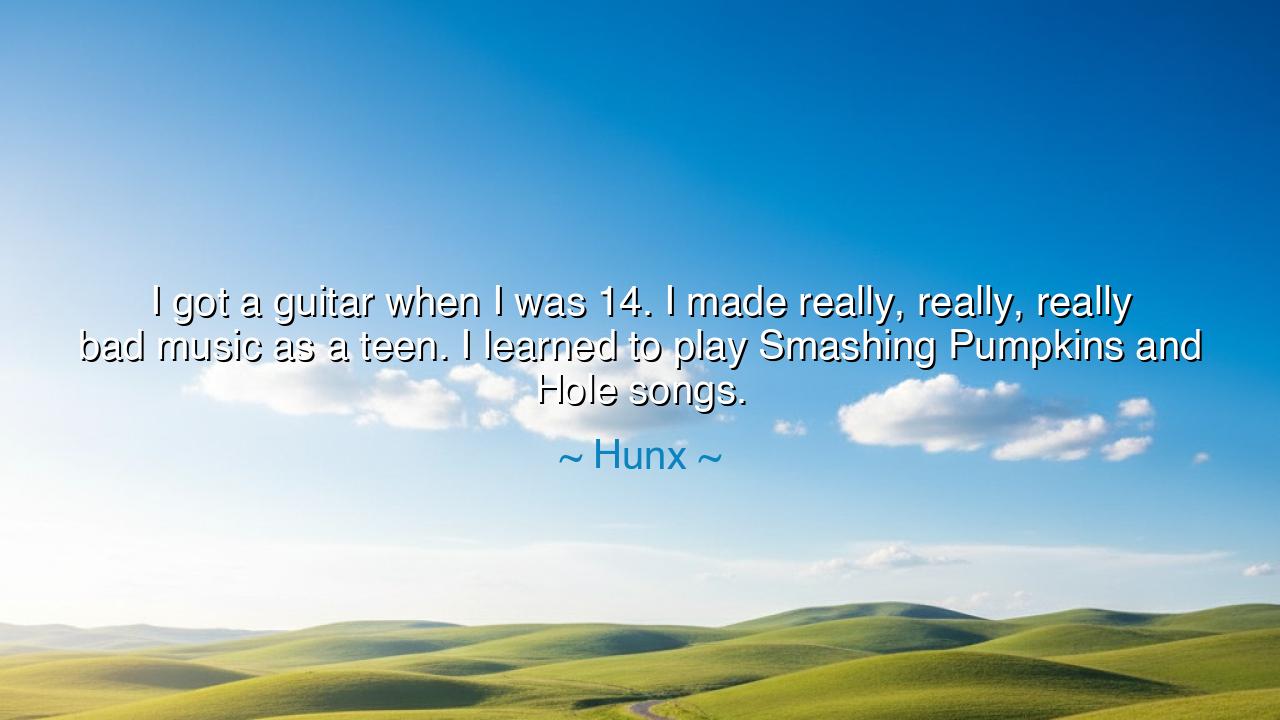
I got a guitar when I was 14. I made really, really, really bad
I got a guitar when I was 14. I made really, really, really bad music as a teen. I learned to play Smashing Pumpkins and Hole songs.






When Hunx reflected, “I got a guitar when I was 14. I made really, really, really bad music as a teen. I learned to play Smashing Pumpkins and Hole songs,” he spoke to the timeless journey of apprenticeship, where greatness begins not in brilliance but in imperfection. These words, humble and self-mocking, conceal a deep truth: that every artist begins with noise before they find their voice. The sacred path of creativity always passes through the valley of clumsy beginnings, where the hand fumbles, the ear misjudges, and yet the heart insists on pressing forward.
The guitar at fourteen was more than an instrument—it was a key, unlocking the world of expression. To hold an instrument in youth is to hold a weapon against silence, a tool for shaping the unformed storms of the soul into sound. Though Hunx calls his early work “bad,” it was in truth the most necessary kind of music: the raw, unpolished attempt that dares to exist. For without such beginnings, no flowering of artistry can ever take place. The seed does not bloom in its first season, yet its struggle in the dark soil is sacred.
His mention of Smashing Pumpkins and Hole speaks to the lineage of influence. The young artist learns first by echoing others, borrowing the chords and cries of those who came before. Just as the apprentice painter once copied the masters, or the young poet memorized the verses of Homer, so Hunx began by strumming the songs of his idols. This is not theft but initiation. By living within another’s music, the apprentice slowly discovers the contours of their own. The imperfect covers and clumsy riffs are not failures, but stepping stones toward originality.
History shows us this pattern again and again. Think of Beethoven, whose early compositions were seen as clunky imitations of Haydn and Mozart. Yet through those imitations, he forged his own thunderous voice that shook the heavens. Or recall the young Picasso, who first mastered the most traditional forms before he shattered them into cubist visions. Hunx’s teenage attempts, though “bad” by his own account, carried within them the same eternal process: to stumble, to echo, to experiment, until one day the artist is born.
The deeper meaning of his words is that imperfection is the path to mastery. Too many fear to create because their first efforts are unworthy. Yet it is precisely by enduring the unworthy attempts that one reaches worthiness. The awkward, off-key songs of adolescence are not to be mocked, but to be cherished as necessary rites of passage. Hunx’s honesty becomes a beacon to all who doubt themselves: greatness does not arrive fully formed, it crawls out of error, repetition, and persistence.
The lesson here is eternal: dare to be bad before you can be good. Embrace the awkwardness of your beginnings. Do not despise the rough sketches, the clumsy notes, the trembling performances. They are the fire through which all artists must walk. What matters is not the perfection of the early work, but the courage to create at all. For only those who risk failure earn the right to touch greatness.
Practical wisdom follows. If you are young and beginning, create freely and shamelessly. If you are older and ashamed of your early works, honor them as sacred stones on your journey. Look back at them not with ridicule but with gratitude, for without them you would not stand where you are. And always, learn from those who inspire you, not to remain their echoes, but to discover the unique voice that only you can offer.
Thus Hunx’s words, spoken with humor, rise into a teaching: that the teen years of awkward strumming and flawed songs are as important as the polished performances that follow. For in the fumbling chords of youth lies the raw truth of creation—the courage to begin. And so we pass this wisdom forward: pick up your instrument, write your clumsy lines, paint your crooked strokes. For the world does not demand perfection—it demands your voice, your effort, your becoming.






AAdministratorAdministrator
Welcome, honored guests. Please leave a comment, we will respond soon